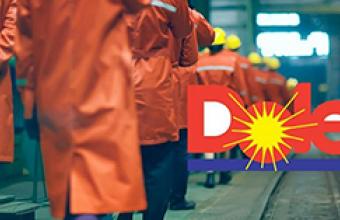In January this year tropical fruit producer Dole closed its maintenance workshop in port of Limón, Costa Rica, laying off 240 workers. But in a welcome move in an area of high unemployment, the multinational has agreed to loan its workshop facilities to an engineering maintenance cooperative set up by the laid off workers.
The Coopesitraco R.L is made up of 124 of the former Dole employees and has signed an agreement that provides them with a one-year loan of the facilities of the Dole workshop to launch its business maintaining and repairing containers, trucks, cargo cranes at the Moín Container Terminal. Once the loan year is over, Coopesitraco will be able to assess the possibility of signing a rental contract with the company to continue using the facilities with responsiblity for the property.
“It is gratifying to see how in a record time these people managed to form a self-managed cooperative that will allow them to start their own business. These people were unemployed only a month and a half” said Luis Diego Aguilar, Deputy Minister of Labor for the area of Solidarity Social Economy.

Photo: The signing ceremony at Dole’s workshop attended by the Vice President of the Republic, Marvin Rodríguez
The agreement was signed by the Minister of Labor and Social Security (MTSS), Steven Núñez; the executive director of Infocoop, Gustavo Fernández; Juan Carlos Alférez and Marco Tulio Escobedo, of the Standard Fruit Company of Costa Rica SA and Carlos Dávila Curtis, manager of Coopesitraco RL
“We are very pleased to give the final push so that the cooperative can start its business and start providing services. Since the beginning of this process, the commitment and desire to work of each worker was always obvious. This process represents another example of the importance of wanting to do things well in a climate always of peace of work and social dialogue,” said the Minister of Labor.
For his part, Vice President Rodríguez said that “the cooperative is founded as an alternative to solve the unemployment situation of these workers through a self-managed cooperative. This model will help mitigate unemployment in the area, in addition to renewing hope in the community that it is possible to organize and move forward.”
